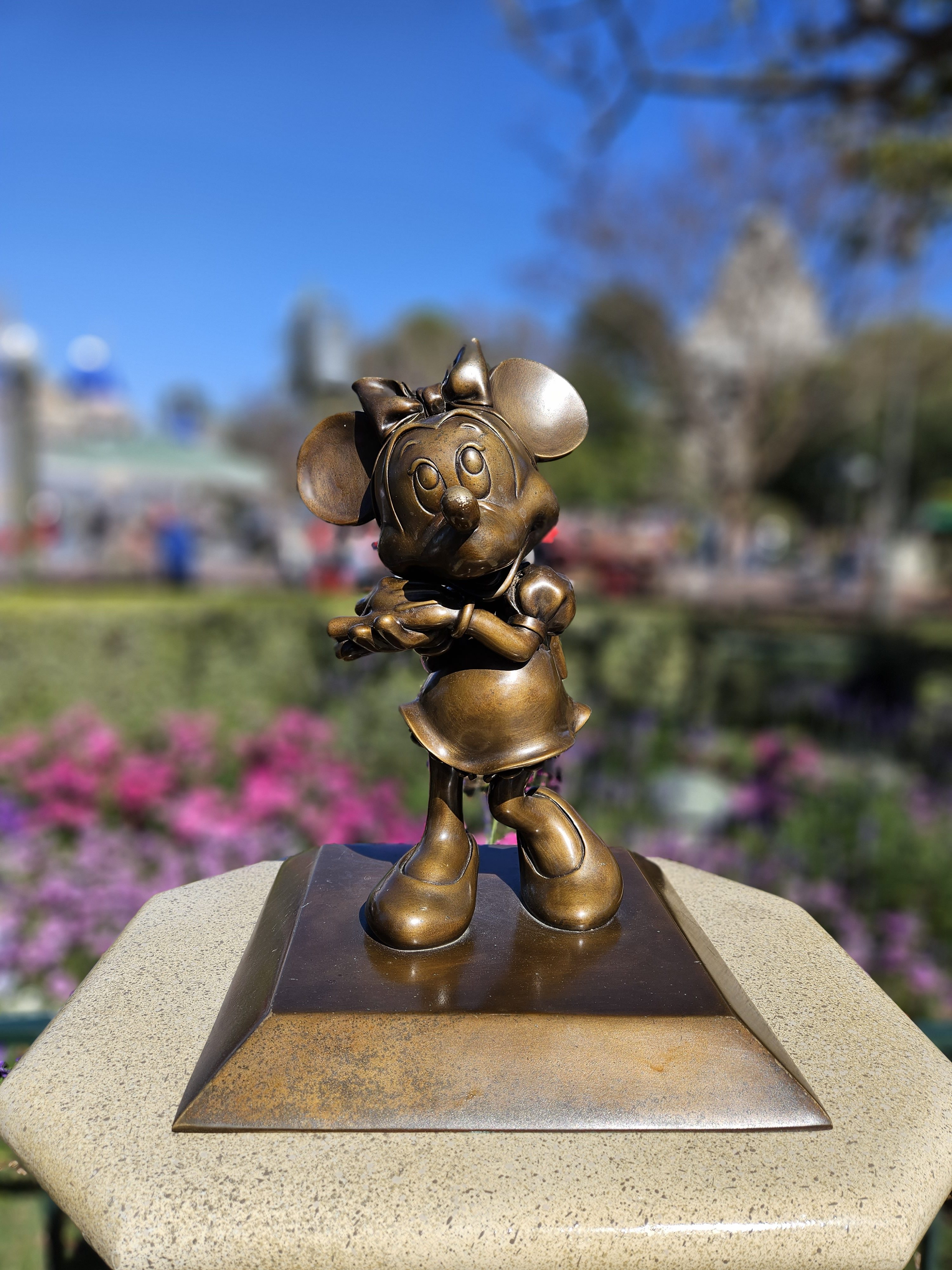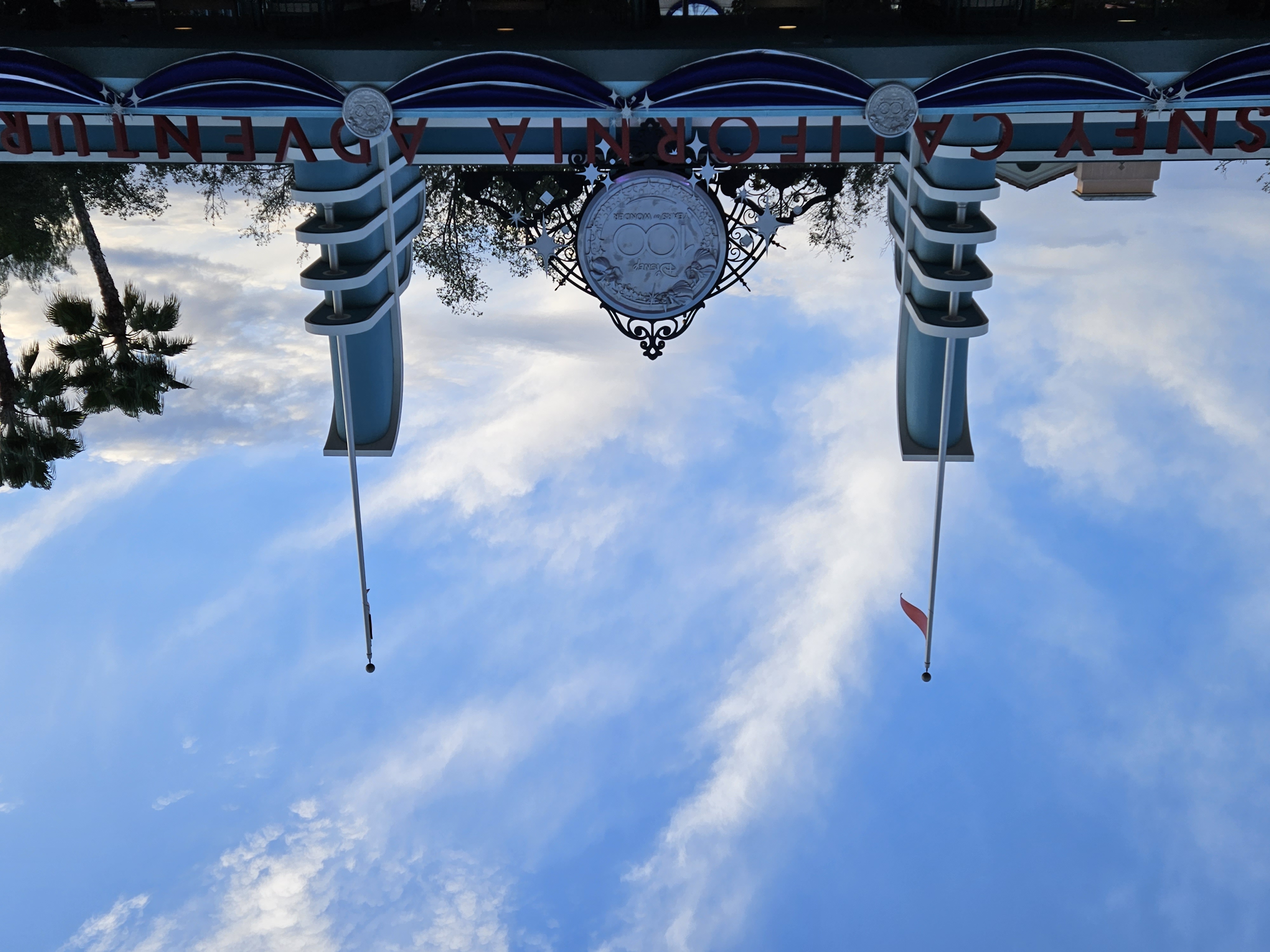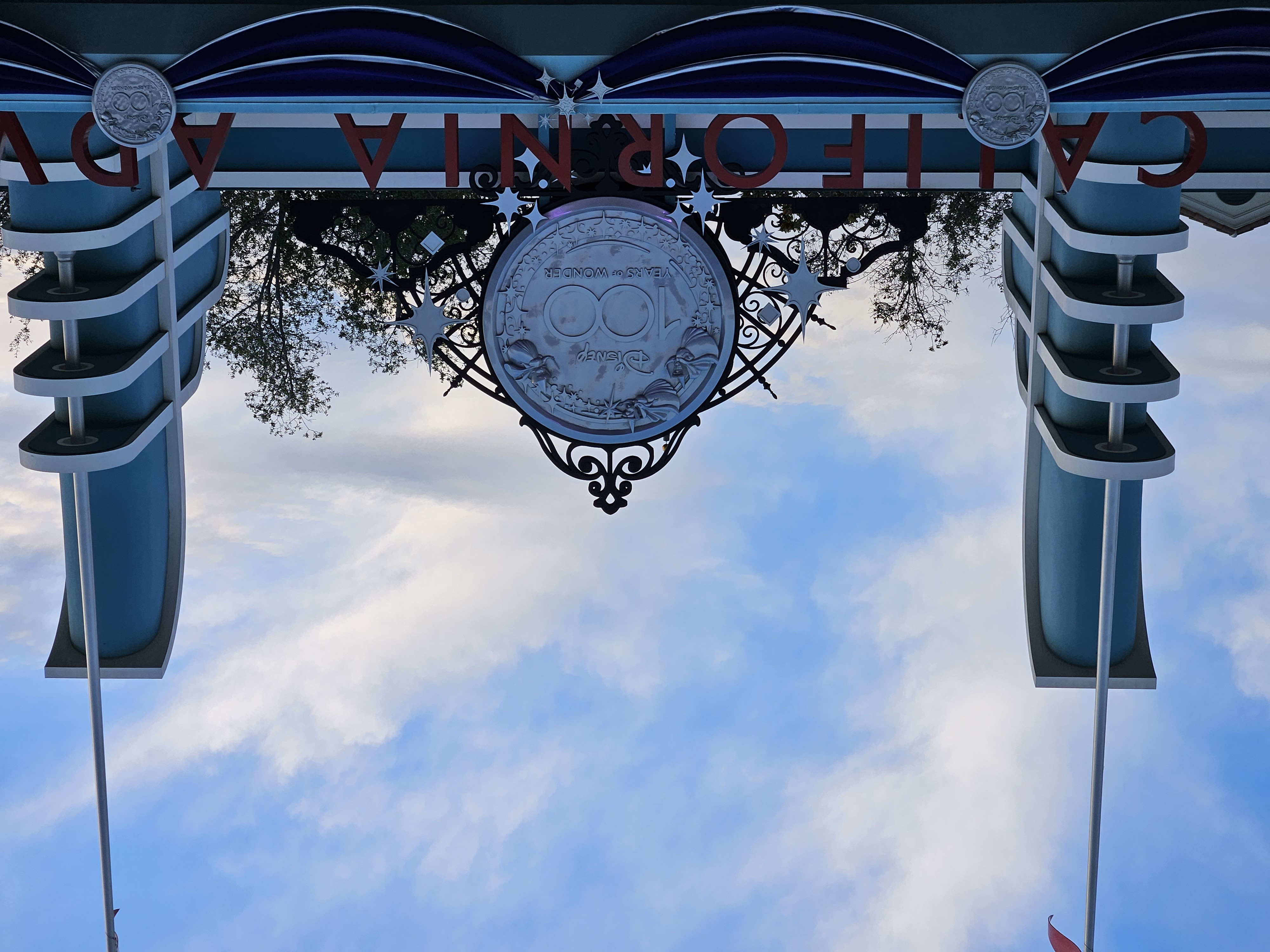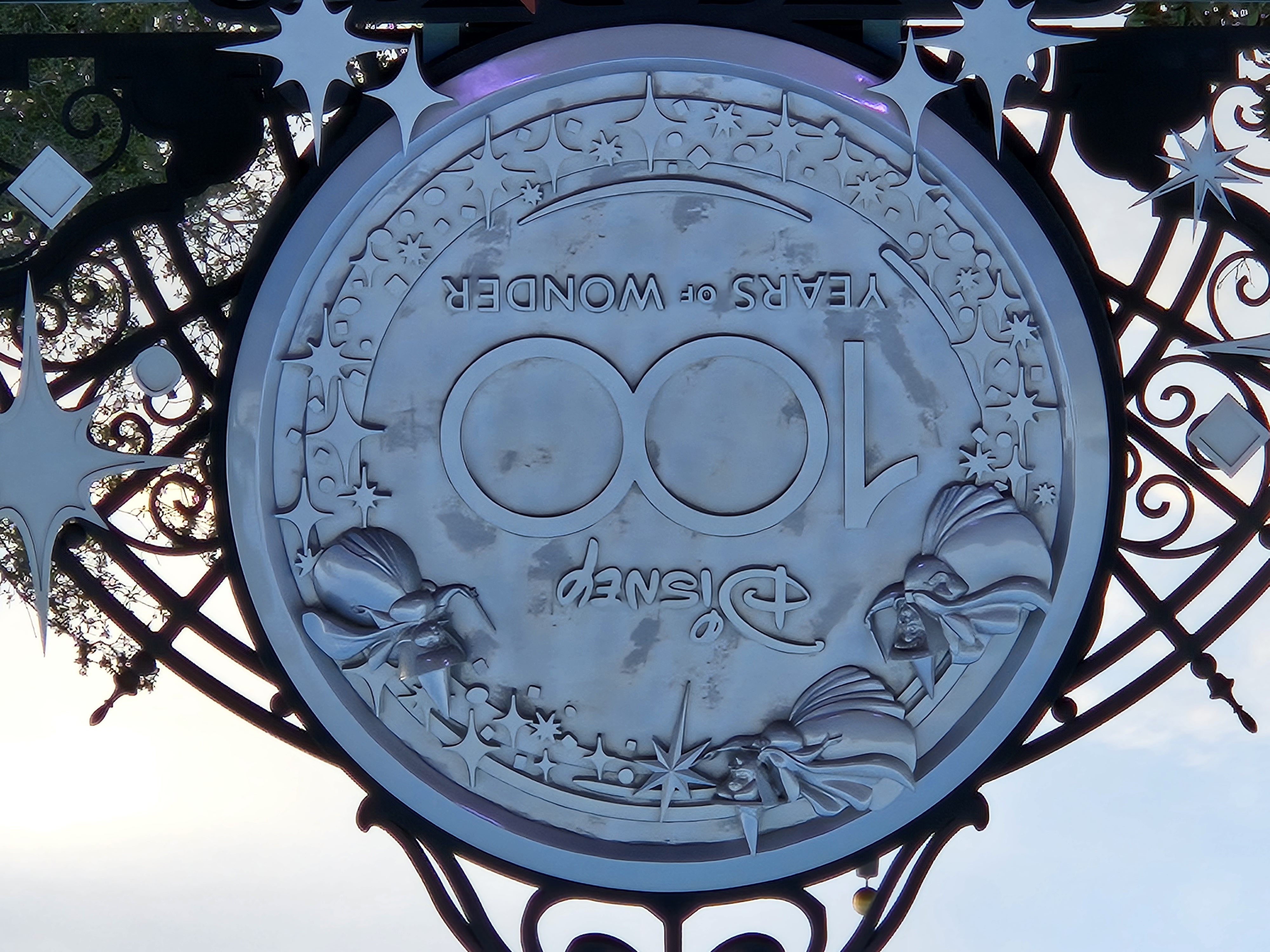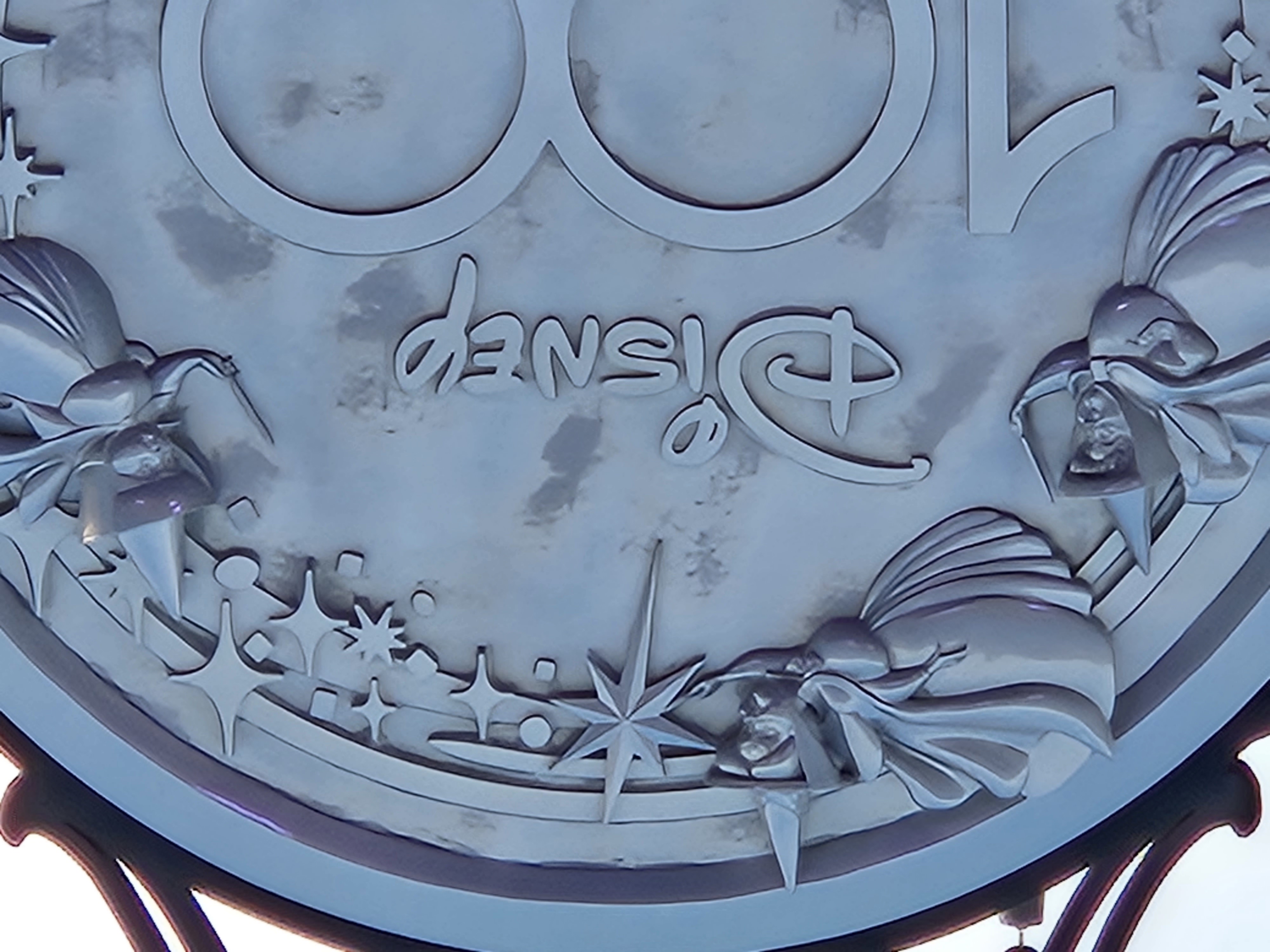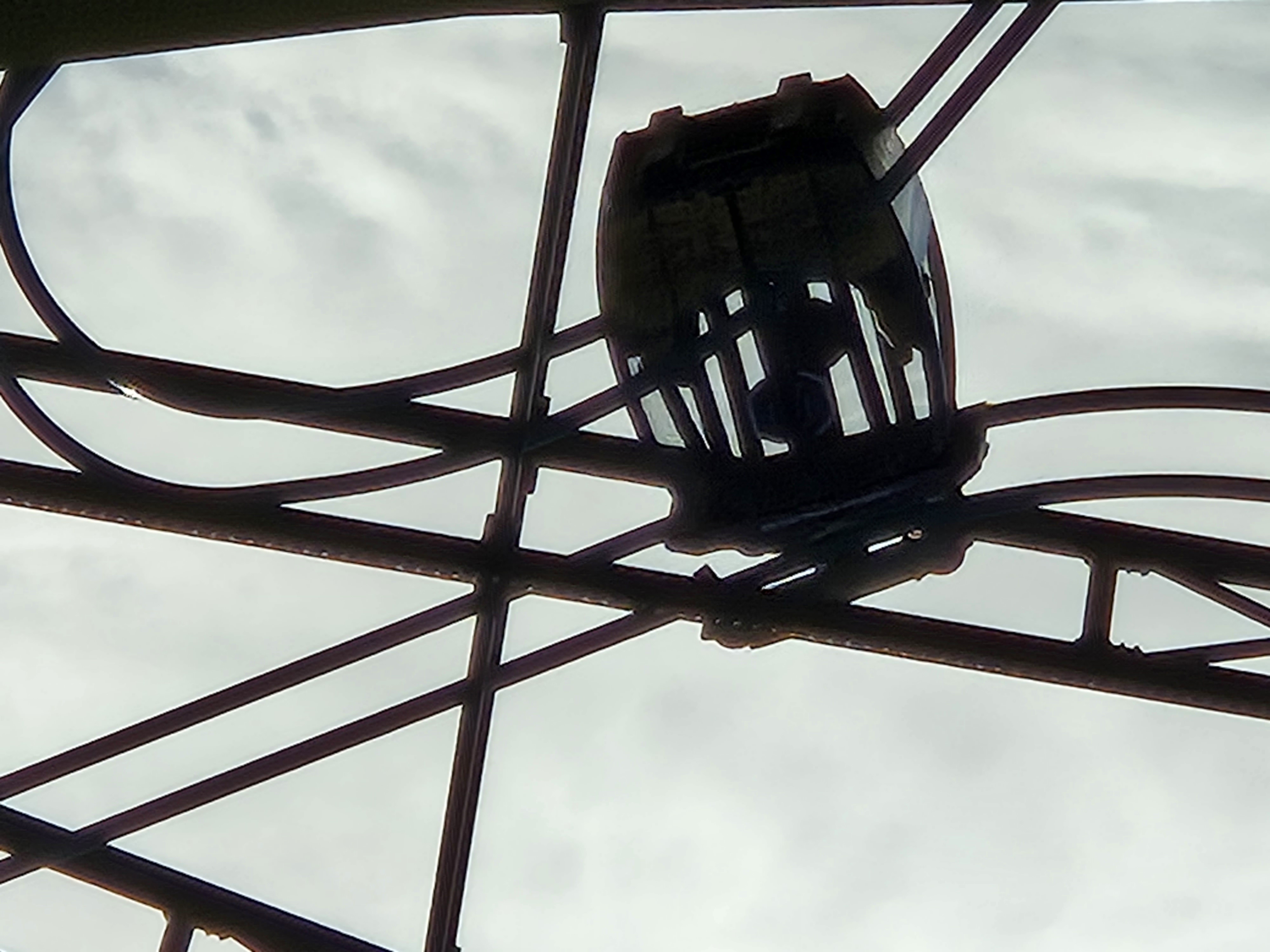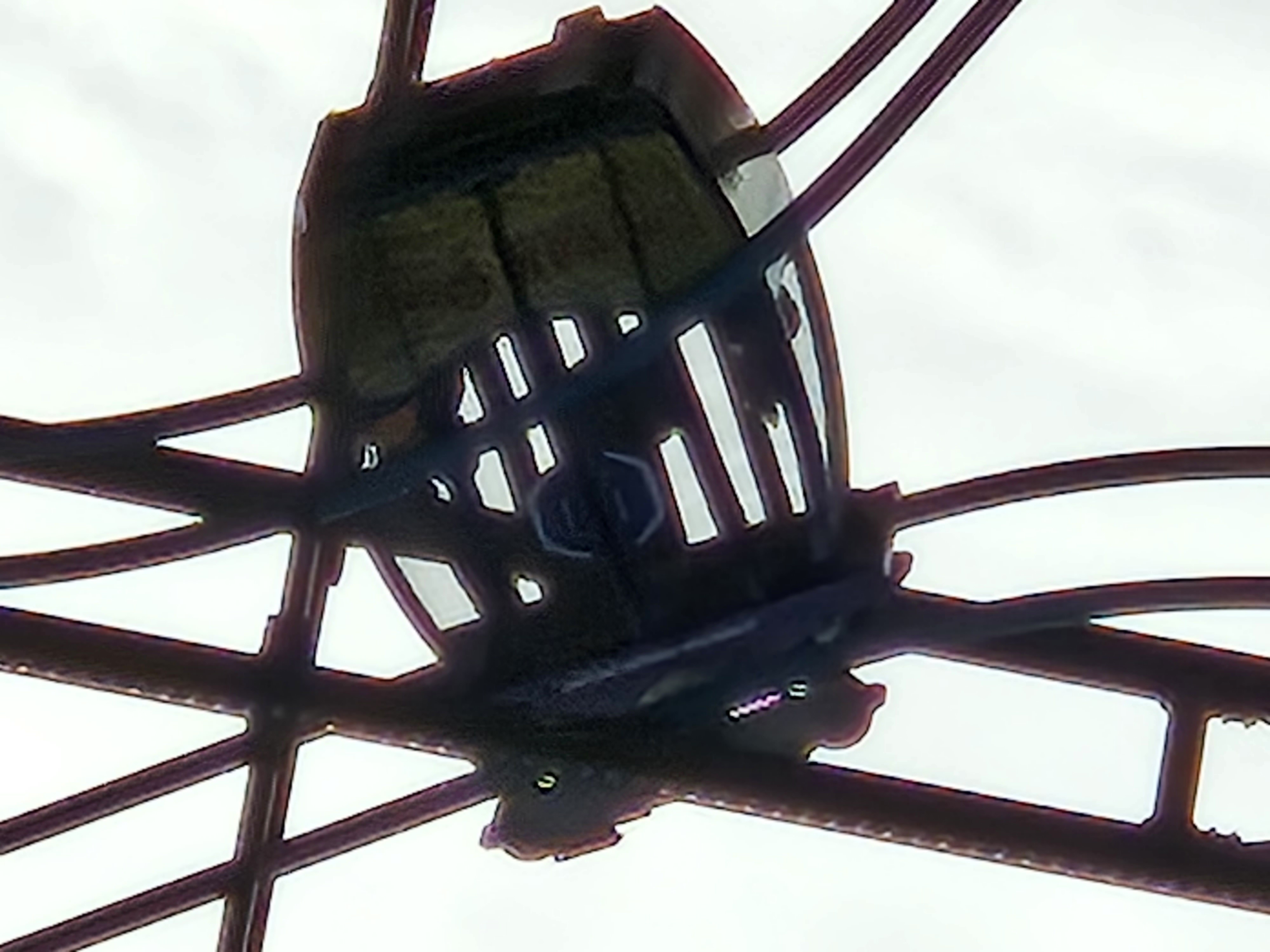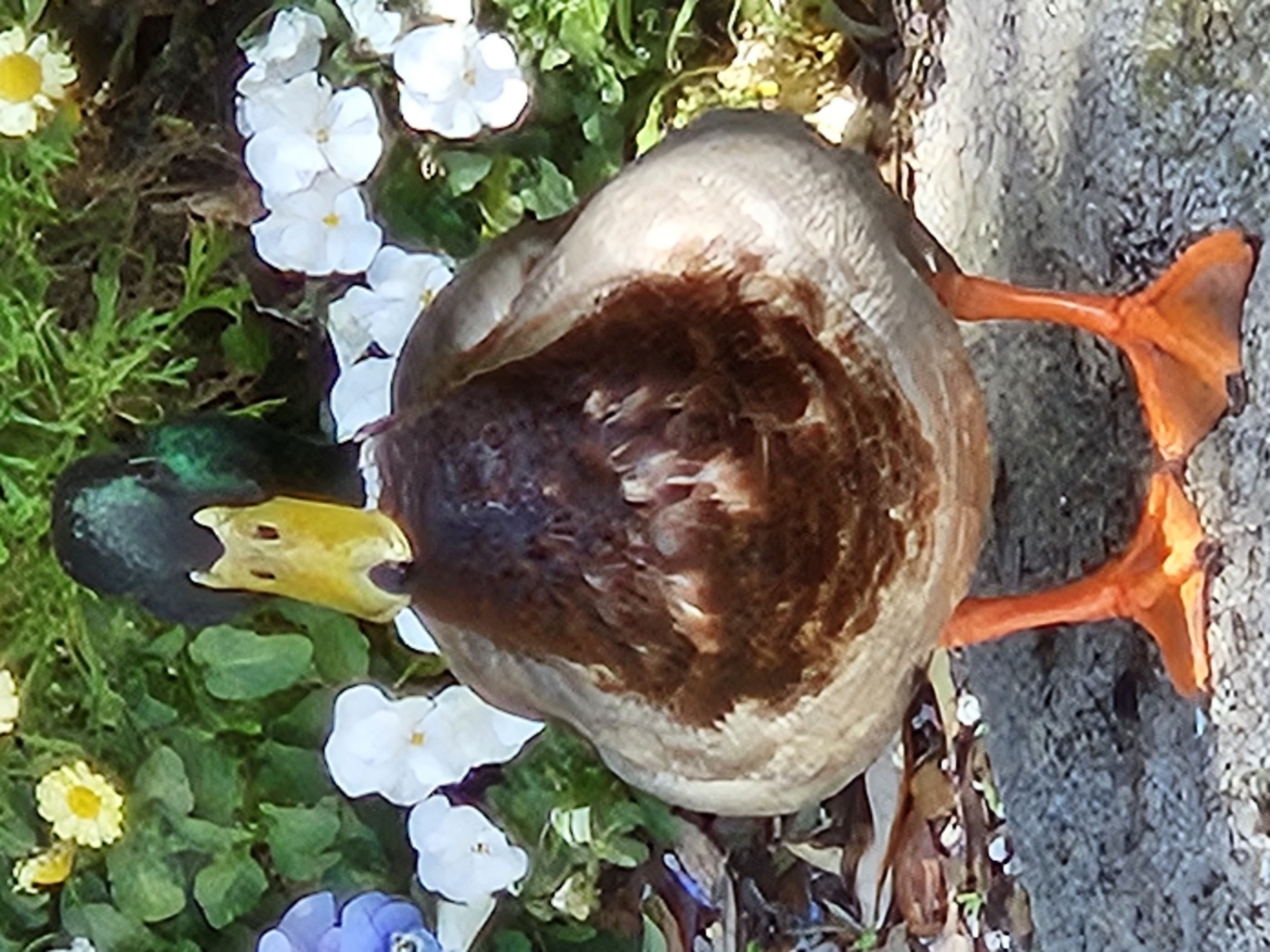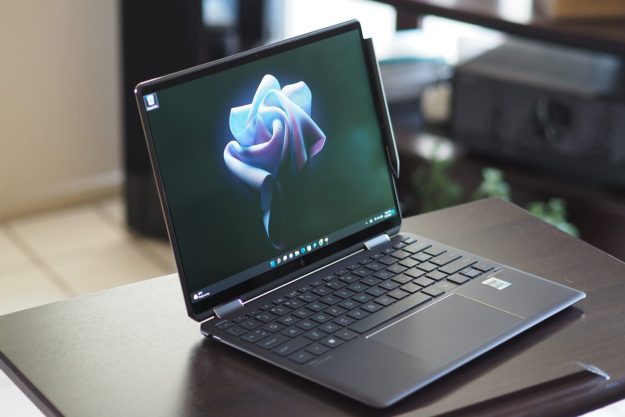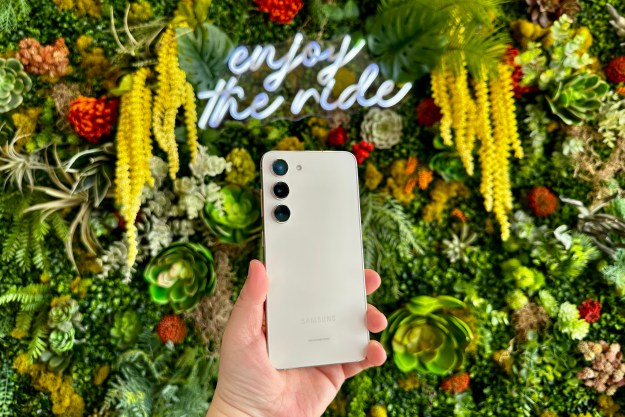
“The S23 has a clean design, a compact size that makes it comfortable to hold, a gorgeous display, a snappy processor, and reliable cameras. There's a lot to like about this one.”
- Sleek and compact design
- Comfortable for one-handed use
- Very fast performance
- Reliable cameras take great photos
- Long-lasting battery life
- Five years of guaranteed updates
- Base storage is still 128GB
- Fast charging up to only 25W
- Limited zoom quality past 10x
Since 2010, there has been a Samsung Galaxy S phone. It has become one of Samsung’s most popular products, and one of the most prolific Android phones on the market. This year, we have the Galaxy S23 series, and the regular Galaxy S23 exists as the smallest and cheapest of the trio.
I’ve been a lifelong iPhone user, but the Galaxy S23 is becoming one of my favorite alternatives since I’ve joined Digital Trends. It may be the smallest and cheapest of the S23 family, but honestly, there’s a lot to love here.
About our Samsung Galaxy S23 review
This review was written by Christine Romero-Chan after over two weeks of use in the U.S. Samsung provided a T-Mobile SIM card to use with the Galaxy S23. We’ll continue to regularly use the Galaxy S23 in the coming weeks and months and will update this review when necessary.
Samsung Galaxy S23: design
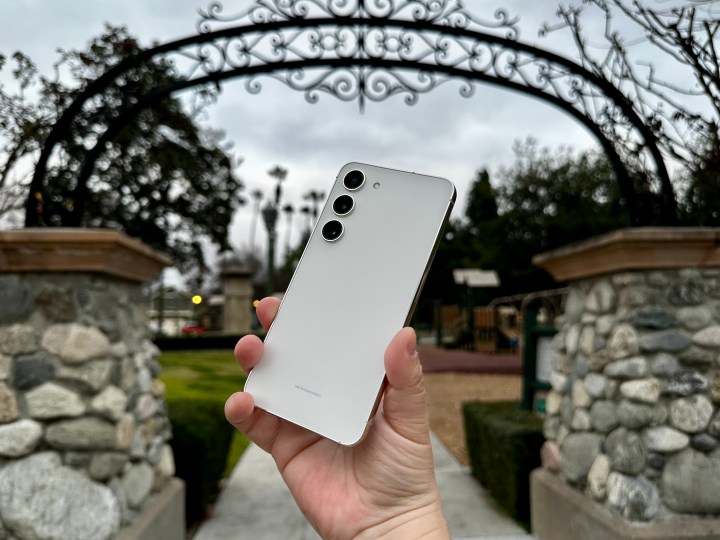
Unlike the Galaxy S21 and Galaxy S22 before it, the Galaxy S23 has a refreshed design that is more akin to other modern smartphones, like the iPhone 14 Pro. It no longer has the camera island housing; instead, the cameras are now freely floating on the back. The bumps aren’t quite as big as seen on an iPhone, but it’s not completely flush. Still, it’s a sleek, clean design that should appeal to minimalists. It’s also the same design you’ll find on the Galaxy S23 Plus and Galaxy S23 Ultra.
Samsung uses Gorilla Glass Victus 2 on both the front and the back glass, and the glossy metal frame features Samsung’s Armor Aluminum. The S23 also has an IP68 rating, which means it’s fairly dust and water-resistant. If you tend not to use a case or screen protector on your phones, the S23 should be pretty durable. But if you don’t want to leave anything to chance, looking at a Galaxy S23 case or Galaxy S23 screen protector certainly won’t hurt.
The Galaxy S23 has a simple design with rounded corners and slightly curved edges, which reminds me of the old iPhone 11 design. However, the front display is flat with the frame, and the bezels are relatively thin compared to what I’m used to.

The buttons feel good, with a tactile click, and as part of Samsung’s efforts toward sustainability, are even made from recycled materials. Even the speaker grille is made with sustainable materials, and some recycled glass can be found in the Gorilla Glass Victus 2. The packaging and plastic screen cover are also eco-friendly.
My favorite part about the S23’s design is just how comfortable the size is and how lightweight it is. At just 5.93 ounces, it’s much lighter and easier to use than my iPhone 14 Pro that clocks in at 7.27 ounces (without my case and MagSafe PopSocket). That’s even more the case when compared to the S23 Ultra at 8.25 ounces. Thanks to the lightweight feel of the Galaxy S23, I found it comfortable to hold for long periods of time and even use comfortably with one hand — though this may be in part because of a case. Without a case, I found the matte glass on the back of the S23 to be a little slippery.
Samsung Galaxy S23: colors

The review unit I received is the Cream color, which is a creamy, off-white color. If you had the Phantom White S22, you’ll notice that the Cream definitely has a tad of beige to it, especially if you view them side by side together. I personally like the Cream color, as it’s a light neutral tone that will go with anything and makes some case designs pop more. For example, the Cream color really helps make the lavender flowers on my Coach case pop, as seen in the photo above.
If you don’t like white shades, the other Galaxy S23 colors include Phantom Black, Lavender, and Green. If you buy an S23 directly from Samsung’s website, you can also choose from the exclusive Lime and Graphite options.
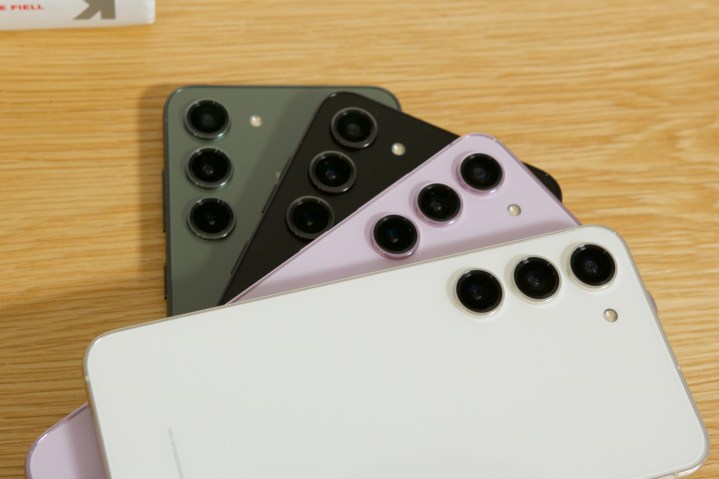
The Phantom Black is a good option if you want a dark neutral color that matches everything, and it’s definitely a pure black shade, versus Graphite, which is more of a dark gray, gunmetal-like hue. I honestly don’t really understand why Samsung made one of the exclusive colors so similar to one of the regular colors, and also in one of the more safe hues.
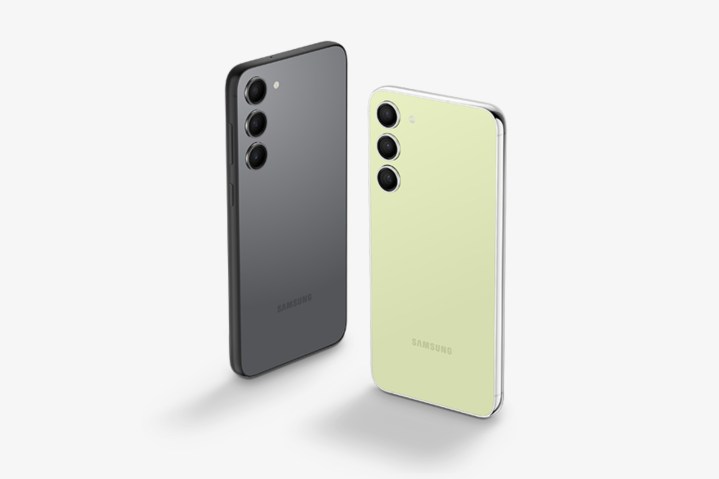
At least the Lime color is a bright and refreshing yellow-green, like a freshly cut slice of a juicy lime. The regular Green color is more of a military, olive-like green shade that may not appeal to everyone. It reminds me a bit of the Midnight Green iPhone 11 Pro back in the day. However, depending on the lighting, the Green can shift and look more appealing at certain angles and lighting. Regardless, neither Lime nor Green are totally neutral colors, so they might be harder to match with a good case or even an outfit.
Lavender is like if Cream had a hint of pink (technically purple) to it. It’s very subtle, and it actually looks more like a pale pink than lavender. If you prefer something that has just a dash of color and a bit of femininity to it, then Lavender is the way to go.
Samsung Galaxy S23: screen

The Galaxy S23 has a 6.1-inch Dynamic AMOLED 2X display that features a Full HD+ resolution and a 120Hz adaptive refresh rate. The resolution sits at 2340 x 1080 pixels, which means 425 pixels per inch (ppi). It should also be noted that the display on the S23 and the S23 Plus are both completely flat, unlike the S23 Ultra, which is curved near the edges. To me, the flat design is sleeker and more practical.
From the moment I turned the Galaxy S23 on, I was thoroughly impressed by the screen.
When you go outside in bright sunlight, the peak brightness is capped at 1,750 nits, which is the same as the S23 Plus and the S23 Ultra. It may not be as bright as Apple’s iPhone 14 Pro series (2,000 nits outdoors), but it’s still very usable on Southern California’s bright and sunny days. Though it’s been a bit gloomier lately than I’d like, I have no problem using the S23 outside in direct sunlight when Mother Nature allows it.
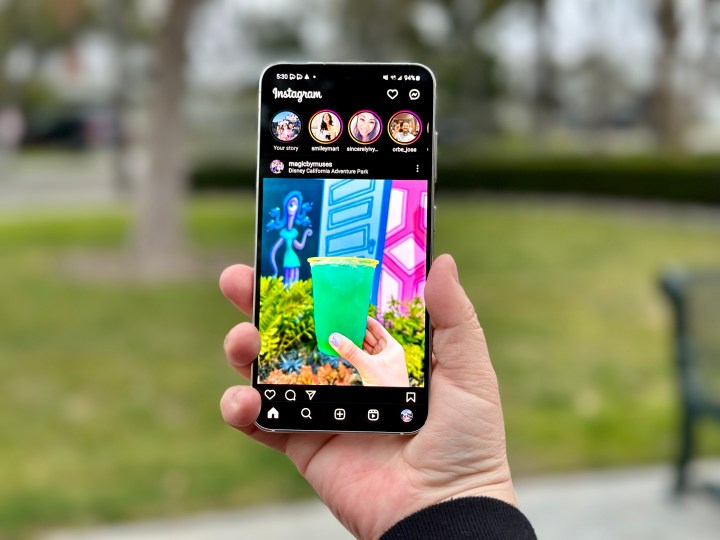
From the moment I turned the Galaxy S23 on, I was thoroughly impressed by the screen. It’s incredibly vibrant in its colors — the blacks are rich and deep, and text is sharp and crisp — just as you’d expect from a flagship phone. The 120Hz adaptive refresh rate also makes scrolling very smooth, though Android’s lack of elasticity compared to iOS will always be a bit jarring to me.
I do have to admit that because Samsung’s displays tend to be much more vibrant than other devices, it may make photos taken with the device appear overly saturated. However, when I view the photos I take with the S23 on a different device, like my iPhone 14 Pro or Pixel 7, they look a little toned down. This is a clear demonstration of how Samsung’s displays really make things “pop” on the screen (even a little too much sometimes).
Samsung Galaxy S23: performance and software
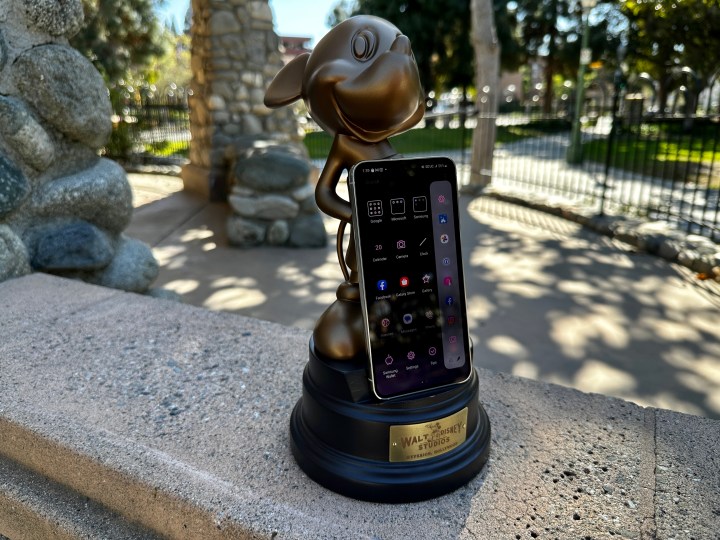
Samsung’s Galaxy S23 is powered by the latest and greatest chip from Qualcomm: the Snapdragon 8 Gen 2. But this is not quite the same chip that you can find in other premium Android phones this year, like the OnePlus 11.
No — Samsung wants you to know that this is the Snapdragon 8 Gen 2 for Galaxy, which is a special version of the processor that is specifically optimized for Galaxy devices. What makes this one different? Samsung and Qualcomm worked together to make this particular version of Snapdragon 8 Gen 2 have a faster CPU clock speed and more software efficiency for image processing. Enough of the mumbo jumbo — basically, Snapdragon 8 Gen 2 for Galaxy makes the S23 superfast.
If you’re the kind of person who upgrades every few years, the S23 will last for a while.
The Galaxy S23 comes in either 128GB or 256GB storage options, and both feature 8GB RAM. It’s unfortunate that the S23 still starts out with only 128GB, while the S23 Plus and S23 Ultra start with 256GB, with the Ultra even going with 12GB RAM in the 512GB and 1TB options. Still, for most people, 128GB is decent, and 256GB should be plenty.

Samsung has shipped the Galaxy S23 with Android 13 and its own custom One UI 5.1 layered over it. With the Galaxy S23 series, Samsung is promising four major Android version upgrades, as well as five years of regular security updates. That means that the S23 will last through Android 17, which is pretty impressive in itself, and it will get security patches for any vulnerabilities through 2028. If you’re the kind of person to upgrade every few years, the S23 will last for a while.
I’ve been using the phone for a few weeks now, and I have yet to encounter any frame rate lag or choppiness in my typical daily use. All the apps I need load up instantly once I open them, switching between apps is simultaneous, and capturing photos and videos is quick. Because of this, it is hard not to take a good picture with the Galaxy S23. And when viewing and editing those photos, rendering edits is just as fast as it is on my iPhone 14 Pro, without being overprocessed like with iOS.
Gaming performance is decent — if you are considering the base model S23, then you may only be playing quick games every now and then. In my testing of the device, I did play a bit of Diablo Immortal. My experience was mostly smooth, though I did notice a tiny bit of stutter and frame rate drops when there was a lot of action going on. And since this is just the regular Galaxy S23, I was unable to max out the graphical settings. But if you’re just looking to play some casual Match 3 games or the like, then the S23 should handle it without breaking a sweat.

I must admit that while I prefer the stock Android experience that you get with Google Pixel phones, Samsung’s One UI is growing on me. It’s a little overwhelming at first, and there are some things that you should look into setting up before really diving into the phone. But once you get those things set up and familiarize yourself with them, then it really just becomes second nature.
One of the new features in One UI that I absolutely love is the fact that you can change the two lock screen shortcuts to anything you want. The interface for customizing the lock screen is similar, but much better than it is on iOS 16 — Apple needs to take a page from Samsung’s book here.
Samsung Galaxy S23: cameras
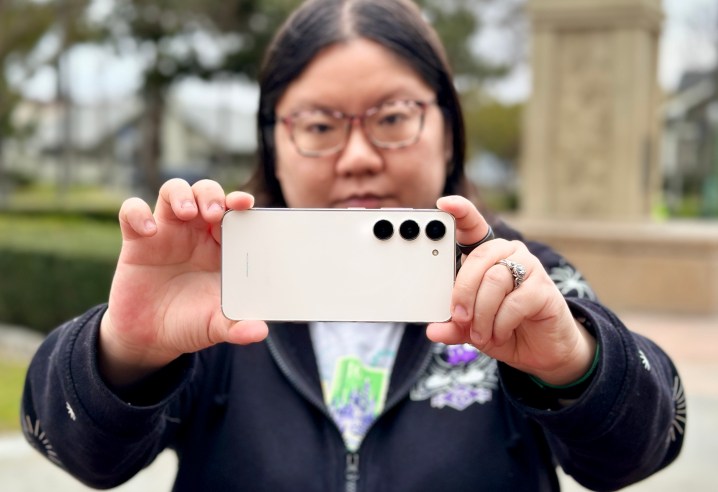
Despite being the base model of the lineup, the Galaxy S23 comes equipped with a triple-lens camera system. You get a 50MP main camera with optical image stabilization (OIS) and f/1.8 aperture, a 12MP ultrawide camera with f/2.2 aperture, and a 10MP telephoto camera with OIS and f/2.4 aperture lenses. The selfie camera is a decent 12MP sensor with dual-pixel autofocus and f/2.2 aperture.
Of course, the main spotlight this year went to the S23 Ultra with its 200MP main camera sensor. Though Samsung should have put the old 108MP camera from the S22 Ultra into the S23 and S23 Plus, the S23 still takes some pretty great photos, all things considered.
I put the camera to the test a few times by trying to capture my 15-month-old toddler’s antics at the park in front of my house. Thanks to the Snapdragon 8 Gen 2 chip, an image is captured fairly quickly once you press the shutter button, and the result is detailed images that are vibrant and punchy in color. I also took the S23 with me to Disneyland, which resulted in sharp, crisp images that are bright and pleasing to look at.
I did feel that sometimes the colors don’t seem 100% accurate to what you see in real life, but that is also due to Samsung’s display, which tends to lean on the brighter, more saturated side. Some photos I took with both my iPhone 14 Pro and the S23, and the iPhone’s images were more realistic and true to life in terms of color. But after taking a look at the S23 pictures on a different display, like the iPhone 14 Pro through Google Photos, the vibrancy and brightness is toned down a tiny bit, making it closer to what you see in reality.
I love to take portrait mode photos whenever I can, and I feel that the Galaxy S23 handles edge detection with portraits better than my iPhone 14 Pro. The Portrait mode images I snapped with the S23 all look great, including selfies, and I slightly prefer the bokeh effect that the Galaxy S23 produces — even on regular photos with the main camera. Night mode photos are also pretty good, as the S23 does a great job of brightening things up when you need it to (though some of the finer details are lost in the noise once you zoom in).
The telephoto lens on the Galaxy S23 can do 3x optical zoom and up to 30x digital zoom. I was excited to try out the 30x zoom feature, but 10x is essentially the limit for getting decent photos. The 20x and 30x photos I took looked like really bad watercolor paintings, for the most part. Some images, like the Disney 100 Years of Wonder sign above Disney California Adventure and a passenger cabin on the Pixar Pal-A-Round, appear passable. But zooming in on a Disney duck at 30x? Yeah, it doesn’t look good. If you want good-looking zoom images (at least up to 30X), then without a doubt, the Galaxy S23 Ultra is the better option.
The selfie camera is also quite good in decent lighting. Selfies I captured appeared mostly true to life, and skin tones don’t appear washed-out. I did notice that sometimes the selfie camera made my lips appear bright and unnaturally orange, but that may have something to do with the lighting, as it doesn’t happen all the time. By default, there is some skin smoothing going on, and you can choose whether skin tone appears natural or warmer, but these can be adjusted to your liking.
It’s hard to capture a bad photo with the Galaxy S23.
In my initial testing phase, I did not take any ultrawide photos — I typically don’t find myself in situations where the ultrawide camera would yield the kind of results I want. However, this may change in the coming weeks as I use the phone more for camera comparisons.
Overall, the Galaxy S23 cameras take great photos for the average person. They’re detailed, vibrant, and punchy, which is definitely appealing. Just keep in mind that the colors may be a little over the top because of the display, but shouldn’t be so outlandish when viewed on other devices. The zoom capabilities are decent up to 10X, but using anything higher than that will depend on what you’re trying to capture. But with the main and selfie cameras, it’s hard to capture a bad photo.
Samsung Galaxy S23: battery and charging
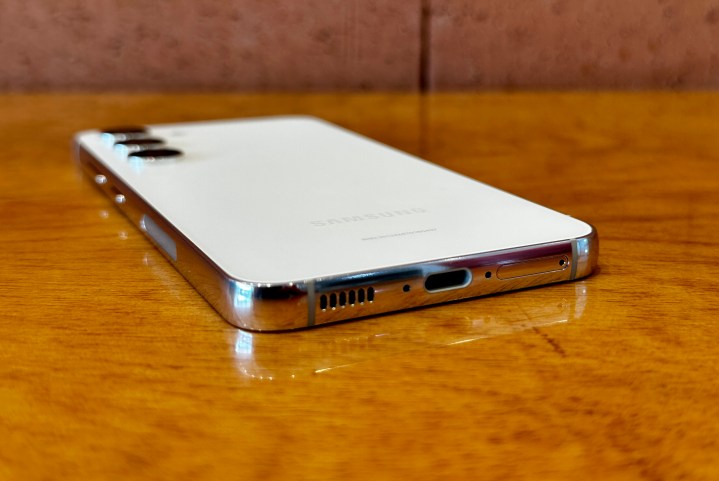
The Samsung Galaxy S23 has a 3,900mAh battery, which is slightly bigger than the 3,700mAh that came in its predecessor. You’ll find a USB-C to USB-C charging cable in the box, but Samsung has opted not to provide a charging adapter, so you’ll need to use one you already have or buy a new one. While the S23 Plus and S23 Ultra support up to 45-watt fast charging, the base S23 only has up to 25W fast-charging speeds, so you’ll get 50% charge in 30 minutes.
In my week with the Galaxy S23, I’m getting around two full days of use from a single charge. Keep in mind that the S23 is not my primary device (that’s my iPhone 14 Pro), so I am not constantly sending SMS messages and making phone calls with the S23. However, I have been using it constantly for checking social media, including Mastodon, Instagram, and Facebook. I use it for my personal Gmail and work email (Outlook), as well as Microsoft Teams, and I’m making the most out of the camera whenever I can. I occasionally play some games with it and watch videos as well.
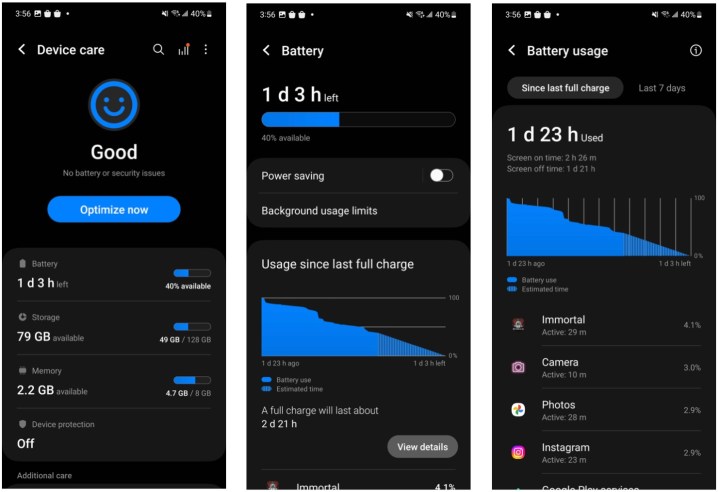
Samsung has the Galaxy S23 listed to last around 22 hours with normal use, which seems about right. If you only have one phone and use the S23 for all of your messages, calls, and everything else, then it should last most of the day before you need to get it on the charger. But if you’re always carrying a portable battery pack or charger anyway, then these numbers don’t really matter.
Wireless charging is capped out at 15W speeds, and you get 4.5W reverse wireless charging. I haven’t used the reverse wireless charging yet myself, but it’s good to have the option in a pinch.
Samsung Galaxy S23: price and availability
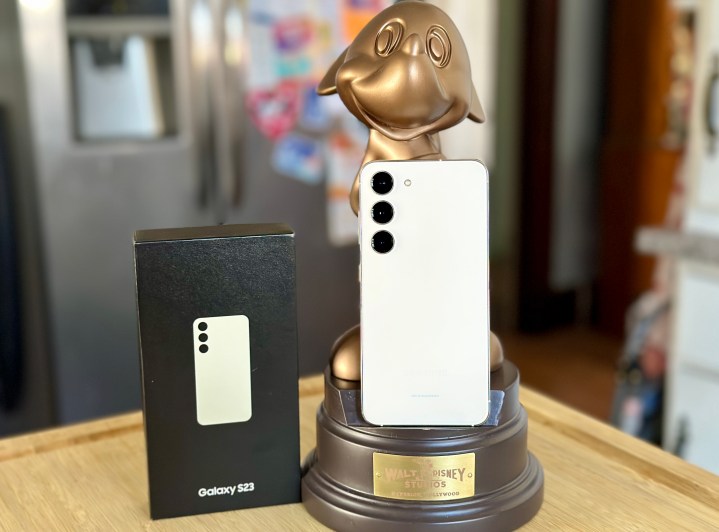
The Samsung Galaxy S23 is available now. The 128GB base model costs $800, and if you need more space, the 256GB version is just $60 more. The S23 comes in four colors: Phantom Black, Cream, Lavender, and Green. If you purchase direct from Samsung, you can also pick from the exclusive Graphite or Lime colors.
Aside from Samsung directly, you can find the S23 pretty much anywhere. You should find one available at your carrier store, Amazon, Best Buy, and other big-name retailers. Just keep in mind that if you want the Graphite or Lime color options, you can only get those by purchasing from Samsung’s website.
Samsung Galaxy S23: verdict
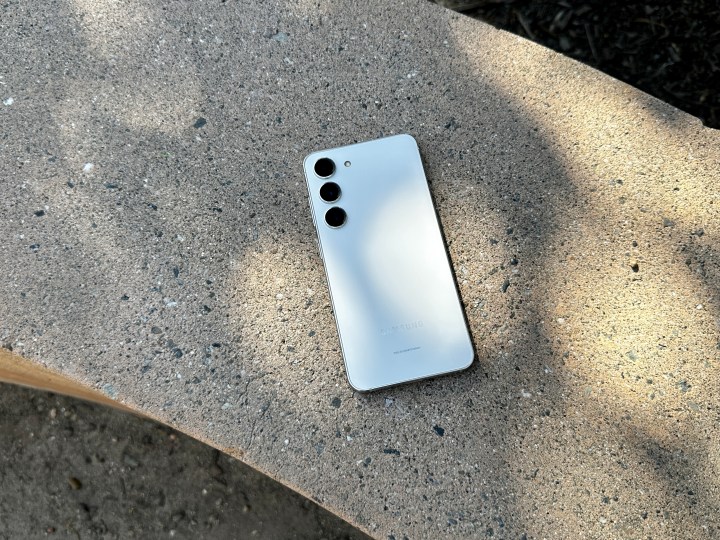
I personally have been enjoying the Samsung Galaxy S23 quite a lot. For $800, you get a phone that has a sleek and compact design that feels excellent to hold and use one-handed. The display is sharp and beautiful, with vibrant colors and rich blacks. Performance is fast and the cameras are reliable.
Plus, the S23 will get major software upgrades for the next four years, and with five years of regular security updates, this phone has longevity. And even though it’s the smallest battery of the S23 lineup, I still found it to be pretty long-lasting, though I wish the charging speed could be faster like its siblings.
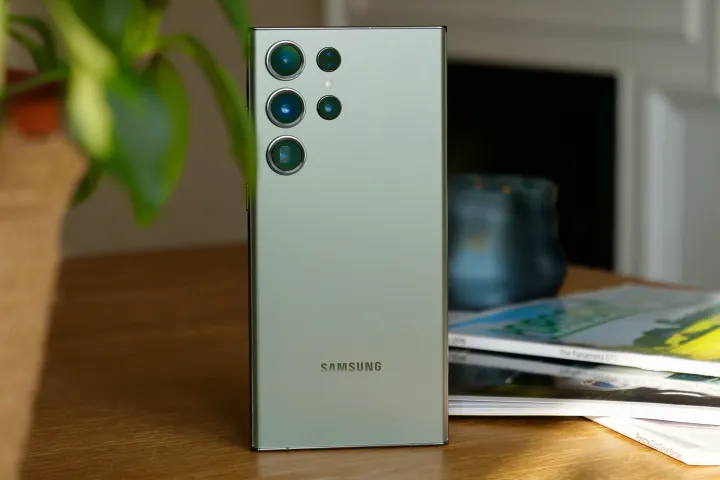
Those who like smaller, compact phones will like the S23. But if you need a larger screen, there’s the Galaxy S23 Plus with a 6.6-inch screen for $200 more. It has pretty much the same specs as the regular S23 but with faster charging. But is that worth the $999 price tag? For a lot of people, probably not. At that point, for $1.200, you could get the Galaxy S23 Ultra, which has the superior 200MP main camera, the largest display, most RAM and storage, and S Pen integration.
Another good flagship option to consider is the OnePlus 11, which is equipped with the Snapdragon 8 Gen 2, a 50MP main camera, and a 6.7-inch AMOLED display, and has long-lasting battery life and even faster charging speeds of up to 80W — all for just $700. However, as stated in our review, it lacks wireless charging capabilities, and the portrait mode camera is a little disappointing. Plus, accessories like cases and screen protectors are hard to come by!
There is also the Google Pixel 7, which is normally just $599, so you could save a little bit of money. It comes equipped with a 6.3-inch OLED display, 8GB RAM with either 128GB or 256GB storage, and a 50MP main camera. However, it lacks a telephoto camera, though you can find that on the Pixel 7 Pro, starting at $899.
Those who are in the market for a new Android phone, but don’t need something as advanced as the Galaxy S23 Ultra, should really consider picking up the regular S23. I feel like it’s a perfect size, and it’s fast and snappy. I’m not sure if it’s worth getting if you still have an S22, though, as the upgrades are pretty iterative and minor. But for everyone else? It’s a fantastic buy.
Editors' Recommendations
- Your Pixel 7 is about to get a whole lot less buggy — here’s why
- Google Pixel Fold: release date and price rumors, leaked specs, and more
- The best voice-recording apps for iPhone and Android in 2023
- Samsung may be getting ready to launch a new AirTag rival this year
- When is my phone getting Android 14? Here’s everything we know










